Ford Transit Transporter vs VW Passat – Differences & prices compared
Compare performance, boot space, consumption and price in one view.
Find out now: which car is the better choice for you – Ford Transit Transporter or VW Passat?
The Ford Transit Transporter (Cargo Van) comes with a Diesel or Electric engine and Manuel or Automatic transmission. In comparison, the VW Passat (Estate) features a Plugin Hybrid, Diesel, Petrol or Petrol MHEV engine with Automatic transmission.
When it comes to boot capacity, the Ford Transit Transporter offers , while the VW Passat provides 690 L – depending on how much space you need. If you’re looking for more power, decide whether the 269 HP of the Ford Transit Transporter or the 272 HP of the VW Passat suits your needs better.
In terms of consumption, the values are 21.30 kWh7.90 L per 100 km for the Ford Transit Transporter, and 0.40 L for the VW Passat.
Price-wise, the Ford Transit Transporter starts at 39900 £, while the VW Passat is available from 35700 £. Compare all the details and find out which model fits your lifestyle best!
Ford Transit Transporter
The Ford Transit Transporter has long been a staple in the commercial vehicle sector, renowned for its reliability and versatility. It offers a comfortable cabin with a modern design that enhances the driving experience, making long journeys more enjoyable. With a focus on practicality, the Transit provides ample cargo space, meeting the demands of businesses and individual users alike.
details @ media.ford.com
@ media.ford.com
 @ media.ford.com
@ media.ford.com
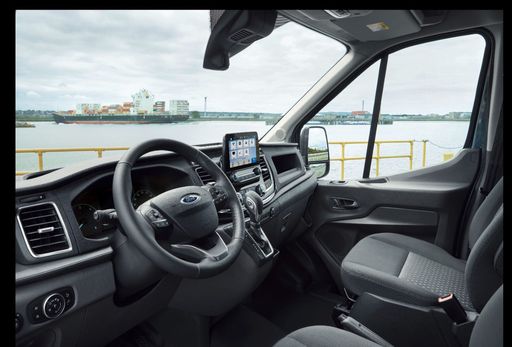 @ media.ford.com
@ media.ford.com
VW Passat
The VW Passat is a staple in the family saloon segment, known for its refined design and practicality. It effortlessly combines a comfortable ride with a spacious interior, making it a popular choice for long journeys. The cabin features high-quality materials and an intuitive infotainment system, providing a premium feel without sacrificing user-friendliness.
details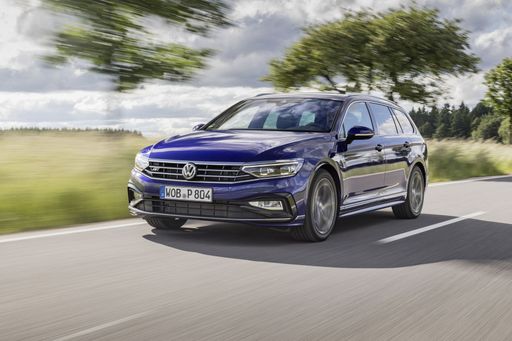 @ volkswagen-newsroom.com
@ volkswagen-newsroom.com
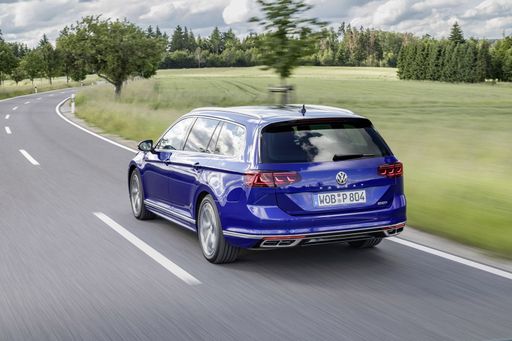 @ volkswagen-newsroom.com
@ volkswagen-newsroom.com
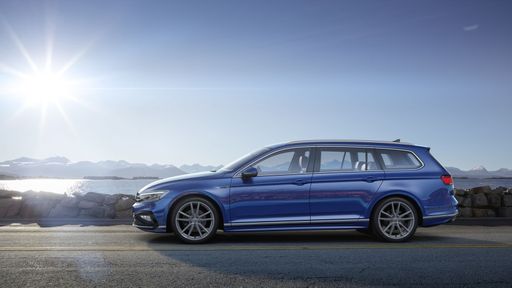 @ volkswagen-newsroom.com
@ volkswagen-newsroom.com
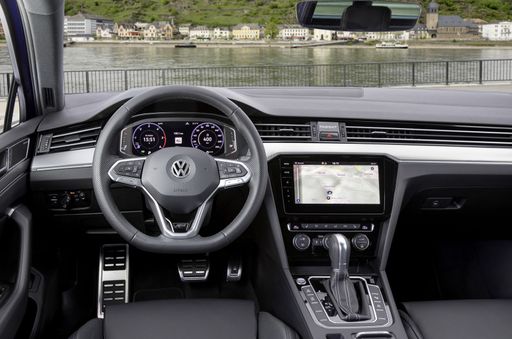 @ volkswagen-newsroom.com
@ volkswagen-newsroom.com

|

|
|
|
|
Costs and Consumption |
|
|---|---|
|
Price
39900 - 69100 £
|
Price
35700 - 57200 £
|
|
Consumption L/100km
7.9 - 10.3 L
|
Consumption L/100km
0.4 - 8.1 L
|
|
Consumption kWh/100km
21.3 - 32 kWh
|
Consumption kWh/100km
-
|
|
Electric Range
247 - 317 km
|
Electric Range
124 - 133 km
|
|
Battery Capacity
68 kWh
|
Battery Capacity
19.70 kWh
|
|
co2
0 - 270 g/km
|
co2
8 - 183 g/km
|
|
Fuel tank capacity
70 L
|
Fuel tank capacity
45 - 66 L
|
Dimensions and Body |
|
|---|---|
|
Body Type
Cargo Van
|
Body Type
Estate
|
|
Seats
3 - 6
|
Seats
5
|
|
Doors
4
|
Doors
5
|
|
Curb weight
2074 - 2765 kg
|
Curb weight
1573 - 1858 kg
|
|
Trunk capacity
-
|
Trunk capacity
510 - 690 L
|
|
Length
5531 - 6704 mm
|
Length
4917 mm
|
|
Width
2059 mm
|
Width
1849 mm
|
|
Height
2530 - 2778 mm
|
Height
1521 mm
|
|
Payload
735 - 2607 kg
|
Payload
501 - 577 kg
|
Engine and Performance |
|
|---|---|
|
Engine Type
Diesel, Electric
|
Engine Type
Plugin Hybrid, Diesel, Petrol, Petrol MHEV
|
|
Transmission
Manuel, Automatic
|
Transmission
Automatic
|
|
Transmission Detail
Manual Gearbox, Automatic Gearbox
|
Transmission Detail
Dual-Clutch Automatic
|
|
Drive Type
Front-Wheel Drive, Rear-Wheel Drive, All-Wheel Drive
|
Drive Type
Front-Wheel Drive, All-Wheel Drive
|
|
Power HP
105 - 269 HP
|
Power HP
122 - 272 HP
|
|
Acceleration 0-100km/h
-
|
Acceleration 0-100km/h
5.8 - 10.7 s
|
|
Max Speed
120 km/h
|
Max Speed
212 - 250 km/h
|
|
Torque
310 - 430 Nm
|
Torque
250 - 400 Nm
|
|
Number of Cylinders
4
|
Number of Cylinders
4
|
|
Power kW
77 - 198 kW
|
Power kW
90 - 200 kW
|
|
Engine capacity
1995 cm3
|
Engine capacity
1498 - 1984 cm3
|
General |
|
|---|---|
|
Model Year
2019 - 2024
|
Model Year
2024 - 2025
|
|
CO2 Efficiency Class
G, A
|
CO2 Efficiency Class
B, D, G, E
|
|
Brand
Ford
|
Brand
VW
|
Ford Transit Transporter
Discovering the Ford Transit Transporter: A Blend of Tradition and Innovation
The Ford Transit Transporter has long been a staple in the commercial vehicle market, known for its reliability and versatility. As Ford continues its innovative journey, the Transit Transporter integrates modern technology and eco-friendly advancements, making it more appealing than ever. Here, we explore some of its key technical details and innovations.
Under the Bonnet: Engine Variants and Efficiency
The Ford Transit Transporter offers a variety of engine options to cater to diverse commercial needs. Among these, the 2.0 EcoBlue Diesel engine provides a robust selection of power outputs, ranging from 105 to 165 PS. Not just limited to traditional fuel, Ford also introduces the E-Transit line with electric motors generating up to 269 PS. This transition to electric is an essential step towards sustainability, achieving an impressive range of 247 to 317 km on a full charge.
Fuel Economy and Environmental Impact
When it comes to fuel efficiency, the Transit Transporter presents a competitive edge with diesel variants consuming between 7.9 to 10.3 L/100km. On the electric side, consumption levels are measured at 21.3 to 32 kWh/100km. Furthermore, the Transit’s CO2 emissions range from zero for electric models to 270 g/km for select diesel engines, placing the vehicle in varying CO2 efficiency classes from G to A.
Performance and Driving Dynamics
Designed for optimal performance, the vehicle’s torque output ranges from 310 to 430 Nm, facilitating smooth and powerful driving experiences across various terrains. The Transit Transporter boasts a maximum speed of 120 km/h, ensuring timely commutes and deliveries, crucial for business efficacy.
The Versatility of Drivetrain Options
The Ford Transit Transporter provides an array of drivetrain configurations, including front-wheel, rear-wheel and all-wheel drive. This adaptability enables the vehicle to tackle different driving conditions with ease, offering stability and resilience no matter the challenge.
Technology and Innovation on Board
Ford’s commitment to innovation is evident within the Transit Transporter’s interior. Intuitive features such as advanced driver-assistance systems, smart connectivity tools, and ergonomic seating arrangements ensure that both driver and passengers enjoy a seamless and comfortable journey, ideal for long rides or daily routines.
Crafted for Practicality and Comfort
With length variations extending from 5531 mm to 6704 mm, and height options from 2530 mm to 2778 mm, the Ford Transit Transporter offers expansive cargo space and flexible seating arrangements. Depending on the variant, seating options range from 3 to 6 seats, catering to diverse passenger and cargo needs.
A Future-Ready, Cost-Effective Choice
Price tags for the Ford Transit Transporter range from €46,589 to €80,611, accommodating different budget requirements. With monthly operation costs calculated between €1430 and €1991, the Transit remains a financially viable option for businesses seeking reliability and efficiency.
Conclusion: An Unyielding Commitment to Excellence
The Ford Transit Transporter stands as a testament to Ford’s dedication to marrying tradition with progress. With its diverse range of powertrains, technological integrations, and practical design, it continues to lead the commercial vehicle segment, ready to meet the challenges of modern mobility and sustainability.
VW Passat
The Evolution of the VW Passat: A Blend of Tradition and Innovation
The VW Passat has long been a staple in the realm of family cars, known for its reliability, spaciousness, and impressive engineering. The latest models uphold this reputation while integrating cutting-edge technology, making them some of the most competitive offerings in the market today.
Engine Options and Performance
The modern VW Passat embraces a wide array of powertrains to cater to different driving preferences. From the nimble 1.5 eTSI ACT petrol-powered mild hybrid with 150 PS to the robust 2.0 TSI petrol variant with 265 PS, there's an engine configuration for every type of driver. For those conscious of fuel efficiency, the plug-in hybrid models offer an impressive consumption rate of just 0.4 L/100 km, with an all-electric range of up to 126 km, providing an eco-friendly solution without compromising performance.
Advanced Transmission and Drive Systems
Every Passat features a sophisticated automatic dual-clutch gearbox, ensuring smooth transitions and optimal fuel efficiency. The drive options include both front-wheel and all-wheel-drive systems, which provide better traction and handling in various driving conditions. The all-wheel-drive system, particularly in the high-performance variants delivering up to 272 PS, ensures superior control and stability even in challenging terrains.
Interior Comfort and Connectivity
The interior of the VW Passat is designed with a focus on luxury and technological convenience. With a wide array of premium materials and ergonomic design, the cabin offers an inviting atmosphere for both driver and passengers. Advanced connectivity features keep you linked to the digital world, with a user-friendly infotainment system that integrates seamlessly with smart devices, ensuring entertainment and convenience on every journey.
Innovative Safety Features
Safety is a key consideration in the design of the VW Passat. The latest models come equipped with an array of state-of-the-art safety features, including adaptive cruise control, lane-keeping assist, and an emergency braking system. These technologies work together to provide a safe and secure driving experience, reflecting Volkswagen's commitment to driver and passenger safety.
Fuel Efficiency and Environmental Impact
The VW Passat stands out in its segment with noteworthy fuel efficiency across the board. With CO2 emissions ranging from just 8 g/km in hybrid models to a maximum of 183 g/km, the Passat offers a broad spectrum of environmentally conscious driving options. This impressive efficiency is complemented by a range of CO2 efficiency classes spanning from B to G, catering to varying environmental preferences.
Conclusion: A Versatile Family Car
In conclusion, the VW Passat remains a remarkable choice for families and individuals seeking a blend of performance, comfort, and advanced technology. Its wide range of options and configurations allow it to meet diverse needs, ensuring that there's a Passat for everyone. With prices ranging from €41,665 to €66,695, the Passat offers premium value in its class, further solidifying its reputation as a definitive all-rounder in the world of estate cars.
The prices and data displayed are estimates based on German list prices and may vary by country. This information is not legally binding.
